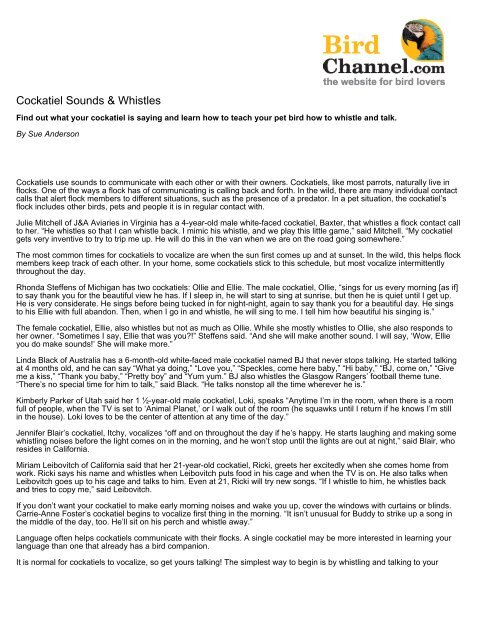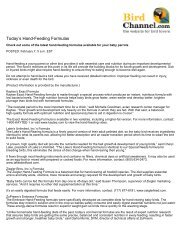Cockatiel Sounds & Whistles - Pet birds
Cockatiel Sounds & Whistles - Pet birds
Cockatiel Sounds & Whistles - Pet birds
Create successful ePaper yourself
Turn your PDF publications into a flip-book with our unique Google optimized e-Paper software.
<strong>Cockatiel</strong> <strong>Sounds</strong> & <strong>Whistles</strong><br />
Find out what your cockatiel is saying and learn how to teach your pet bird how to whistle and talk.<br />
By Sue Anderson<br />
<strong>Cockatiel</strong>s use sounds to communicate with each other or with their owners. <strong>Cockatiel</strong>s, like most parrots, naturally live in<br />
flocks. One of the ways a flock has of communicating is calling back and forth. In the wild, there are many individual contact<br />
calls that alert flock members to different situations, such as the presence of a predator. In a pet situation, the cockatiel’s<br />
flock includes other <strong>birds</strong>, pets and people it is in regular contact with.<br />
Julie Mitchell of J&A Aviaries in Virginia has a 4-year-old male white-faced cockatiel, Baxter, that whistles a flock contact call<br />
to her. “He whistles so that I can whistle back. I mimic his whistle, and we play this little game,” said Mitchell. “My cockatiel<br />
gets very inventive to try to trip me up. He will do this in the van when we are on the road going somewhere.”<br />
The most common times for cockatiels to vocalize are when the sun first comes up and at sunset. In the wild, this helps flock<br />
members keep track of each other. In your home, some cockatiels stick to this schedule, but most vocalize intermittently<br />
throughout the day.<br />
Rhonda Steffens of Michigan has two cockatiels: Ollie and Ellie. The male cockatiel, Ollie, “sings for us every morning [as if]<br />
to say thank you for the beautiful view he has. If I sleep in, he will start to sing at sunrise, but then he is quiet until I get up.<br />
He is very considerate. He sings before being tucked in for night-night, again to say thank you for a beautiful day. He sings<br />
to his Ellie with full abandon. Then, when I go in and whistle, he will sing to me. I tell him how beautiful his singing is.”<br />
The female cockatiel, Ellie, also whistles but not as much as Ollie. While she mostly whistles to Ollie, she also responds to<br />
her owner. “Sometimes I say, Ellie that was you?!” Steffens said. “And she will make another sound. I will say, ‘Wow, Ellie<br />
you do make sounds!’ She will make more.”<br />
Linda Black of Australia has a 6-month-old white-faced male cockatiel named BJ that never stops talking. He started talking<br />
at 4 months old, and he can say “What ya doing,” “Love you,” “Speckles, come here baby,” “Hi baby,” “BJ, come on,” “Give<br />
me a kiss,” “Thank you baby,” “Pretty boy” and “Yum yum.” BJ also whistles the Glasgow Rangers’ football theme tune.<br />
“There’s no special time for him to talk,” said Black. “He talks nonstop all the time wherever he is.”<br />
Kimberly Parker of Utah said her 1 ½-year-old male cockatiel, Loki, speaks “Anytime I’m in the room, when there is a room<br />
full of people, when the TV is set to ‘Animal Planet,’ or I walk out of the room (he squawks until I return if he knows I’m still<br />
in the house). Loki loves to be the center of attention at any time of the day.”<br />
Jennifer Blair’s cockatiel, Itchy, vocalizes “off and on throughout the day if he’s happy. He starts laughing and making some<br />
whistling noises before the light comes on in the morning, and he won’t stop until the lights are out at night,” said Blair, who<br />
resides in California.<br />
Miriam Leibovitch of California said that her 21-year-old cockatiel, Ricki, greets her excitedly when she comes home from<br />
work. Ricki says his name and whistles when Leibovitch puts food in his cage and when the TV is on. He also talks when<br />
Leibovitch goes up to his cage and talks to him. Even at 21, Ricki will try new songs. “If I whistle to him, he whistles back<br />
and tries to copy me,” said Leibovitch.<br />
If you don’t want your cockatiel to make early morning noises and wake you up, cover the windows with curtains or blinds.<br />
Carrie-Anne Foster’s cockatiel begins to vocalize first thing in the morning. “It isn’t unusual for Buddy to strike up a song in<br />
the middle of the day, too. He’ll sit on his perch and whistle away.”<br />
Language often helps cockatiels communicate with their flocks. A single cockatiel may be more interested in learning your<br />
language than one that already has a bird companion.<br />
It is normal for cockatiels to vocalize, so get yours talking! The simplest way to begin is by whistling and talking to your
cockatiel. Try to do this several times a day as a formal lesson. Whistle or talk to your cockatiel briefly whenever you pass<br />
by its cage.<br />
A good way to start teaching your cockatiel to talk is to listen carefully to its sounds. Pick a sound you like and imitate it,<br />
saying it back to your cockatiel. When your cockatiel makes this sound, offer lots of praise.<br />
Like most parrots, a cockatiel can pick up on any sound that it hears, so make sure that your cockatiel is hearing the sounds<br />
you want it to imitate. There are a few methods for teaching cockatiels to talk, but each one requires that you repeat the<br />
whistle or word for about 10 minutes per session several times a day. One method suggests conducting the lessons while<br />
your cockatiel can see your mouth moving. Some people have success with placing the cockatiel on their finger and talking<br />
closely to the cockatiel’s beak. Each cockatiel is different, so follow your cockatiel’s cue. Choose a time and a place where<br />
you can work without other noises or distractions. Pick one word or phrase to begin with. Your cockatiel’s name is a good<br />
one to start with. Repeat it with enthusiasm so that your cockatiel will pay more attention to the word. Say it clearly and<br />
repeat it slowly. Wait until your cockatiel has learned its first word, phrase or whistle before teaching it something new.<br />
You can also purchase CDs made specifically for teaching cockatiels to talk and whistle. Use the tapes for 10<br />
minute-intervals several times a day. Do not let a CD play indefinitely, because it will blend into the background noise, and<br />
your cockatiel won’t be able to differentiate and learn from the CDs.<br />
Let your cockatiel know that you are happy with its vocalizing by praising it, telling him that it is a good bird in an excited<br />
voice and repeating the words and phrases back to it. Don’t be afraid to go a little over the top in your praises.<br />
Many cockatiels learn from each other. Buddy also whistles and talks back and forth with quaker parrot Max. The two of<br />
them have “whistling wars,” according to Foster. “One will start, and the other will try to repeat it back. They don’t often make<br />
it too far, but it is funny to listen to.”<br />
Steffens’ Ollie “has learned the sounds the African grey and Senegal say, so Ollie now uses those, too.” Ollie learned to say<br />
Steffens’ name, from her Senegal parrot. Click here for more suggestions to get your cockatiel talking.<br />
Excerpt from the Popular Birds Series magabook <strong>Cockatiel</strong>s with permission from its publisher, BowTie magazines, a<br />
division of BowTie Inc. Purchase <strong>Cockatiel</strong>s here.









